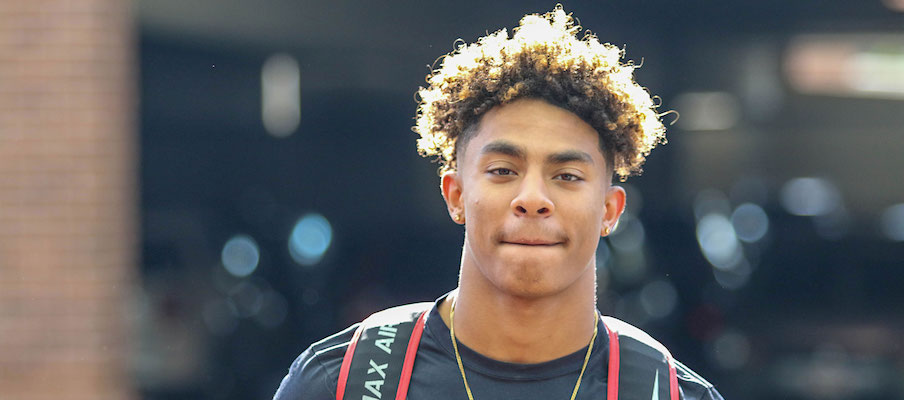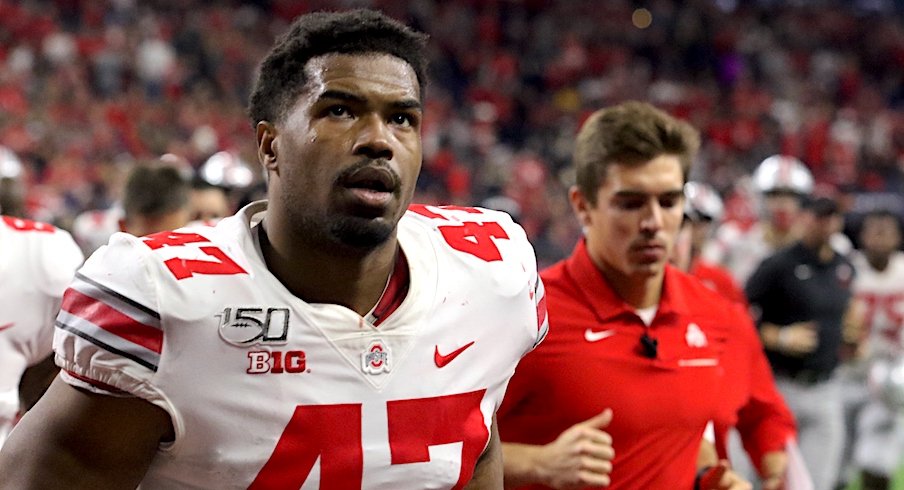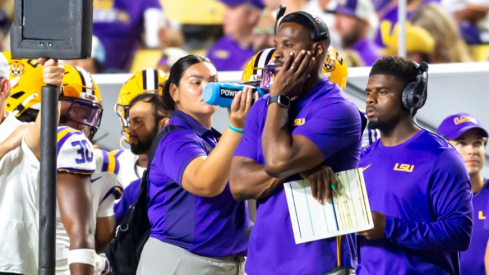In the week since the Big Ten announced last Tuesday that it was shutting down its fall sports and postponing the football season to spring, the parents of Ohio State football players have not been quiet about sharing their thoughts on the decision.
Football Parents at Ohio State, a coalition of many of the team’s parents, sent a letter to Big Ten commissioner Kevin Warren on Saturday calling on him to reconsider the decision not to play and be transparent with players and their parents about why that decision was made. Many parents have also been vocal on their own social media accounts about sharing both their disagreement with the Big Ten’s decision and support for Ryan Day and Ohio State’s efforts to keep their sons safe.
Eleven Warriors caught up with the parents of nine Ohio State football players to get their complete thoughts on the Big Ten’s decision, the answers they’re looking for now, why they felt confident in Ohio State’s COVID-19 protocols, how they feel about the possibility of playing a spring football season and how their sons are coping with the news.
Decision Sparks Disappointment
James Williams, the father of sophomore wide receiver Jameson Williams, said he was “very confused” and “very frustrated” by the Big Ten’s decision to cancel the fall season. Carl Hilliard, the father of senior linebacker Justin Hilliard, said he was “very disappointed with the leadership of the Big Ten.”
Trey Leroux’s mother Tami, who works as a nurse, said she thought the Big Ten “jumped the gun, and I think they should have investigated some more or gave it some more thought time.” Kamryn Babb’s stepmother Amanda, who’s a scientist by trade, said she thought the Big Ten should have only pushed back the start of the season, noting that “things move very rapidly in the field of science” and new developments – like the saliva-based COVID-19 test that received emergency use authorization from the FDA on Saturday – potentially could have enabled the conference to move forward with a football season.
Numerous parents questioned why the Big Ten felt it was necessary to make a decision last week while the ACC, Big 12 and SEC are all still planning to proceed forward with their seasons, and many disputed the notion that their sons would be at any greater risk of contracting COVID-19 while playing football than other students would be simply while returning to campus.
“I really believe that the Big Ten made a call too fast,” Williams said. “If those three conferences play, and the Big Ten don’t play and the Pac-12 don’t play, the Big Ten and the Pac-12 are going to be in some serious trouble, come years down the line, because recruits are not gonna want to come to the Big Ten. And it’s not about Ohio State, because they have a brand that they have built. This is more about the Rutgers, the Marylands, the Illinois, the Northwesterns, that need these kids to love Big Ten football. And right now, Big Ten football is letting a lot of athletes down.”
Several parents expressed frustration with the timeline of the decision, which came just six days after the Big Ten had released a new schedule for the 2020 football season and five days after Ohio State opened preseason camp. While the Big Ten took one step toward canceling the season on Aug. 8, when it informed teams they would not be able to progress to padded football practices until further notice, Tuesday’s announcement still came with little notice to teams like Ohio State, which practiced just hours before the season was called off.
That left some parents wondering why their sons had been asked to follow strict protocols for months only to have their season taken away even after they followed them.
“Just to have it taken away, it’s unfair. It’s not right,” said Jami Smith, the mother of freshman wide receiver Jaxon Smith-Njigba. “And if they were going to make this call, they should have made it long before now. Just to do it abruptly, it’s hard to swallow.”
Added Williams: “They’ve done everything to be safe, and still can’t play. That’s like telling the kid, ‘Hey, do all of these answers and you’re gonna get an A on this paper, and they still turn around and get a D.’”
Not every parent, however, completely disagreed with postponing the season. CJ Cavazos, the father of freshman cornerback Lejond Cavazos, understands how serious COVID-19 is from personal experience – he suffered from double pneumonia after contracting the virus himself earlier this year, while his son also tested positive – and because of that, he understood why the Big Ten made the choice it did.
“I’m kind of really torn in between the decision, because I’m an ex-coach, and I think that football’s a great thing,” Cavazos said. “I think it’s an awesome thing for our kids to play. I think Ohio State’s a phenomenal place to play. But to know somebody like myself that had COVID, and my son that had COVID, not knowing the long-term effects of tomorrow or what might be happening or what might happen, I think the decision that the Big Ten made and that the presidents made, I think it’s a tough decision, but I don’t think it’s a bad decision.”
“They’ve done everything to be safe, and still can’t play. That’s like telling the kid, ‘Hey, do all of these answers and you’re gonna get an A on this paper, and they still turn around and get a D.’”– James Williams, father of wide receiver Jameson Williams, on the season being postponed
A Lack of Transparency
Beyond their disagreement with the decision itself, one common criticism levied against the Big Ten by the parents of Ohio State football players has been the conference’s lack of transparency in specifying why it made the decision. The players and their parents have yet to receive a detailed explanation from Warren on why he felt it was necessary to pull the plug last week, leaving them to wonder what changed in the six days between the schedule release and the season’s cancellation.
“If you’re making a decision about something, and you don’t have solid foundation on the direction you’re going … that’s a tough pill to swallow, to get to the next day and say, ‘OK, things are fine,’” said Corey Teague, the father of redshirt sophomore running back Master Teague. “Because there are just unanswered questions. There’s no closure there. And so that’s not very comfortable to have.”
Williams and Hilliard both questioned whether the decision was truly made in the best interest of players’ health and safety or whether it was simply a matter of liability. And many parents – including Babb and Teague, who were among the parents who led the way in drafting the letter that was sent to the Big Ten on Saturday – believe they are at least owed a Zoom meeting with Warren to have an opportunity to ask them their questions about why the season was canceled and how the conference will help their sons deal with the consequences of that decision.
“Hopefully he doesn’t just send a standard email,” Hilliard said. “It’s time to sit down at the table. It’s time to talk to some parents, some parents who will look you in your face and tell you that the protocols at The Ohio State, Coach Ryan Day and the coaching staff have done a tremendous job.”
Hilliard, as many Ohio State fans also have over the past six days, also takes issue with the fact that Warren’s son Powers, a tight end at Mississippi State, still has the choice to play this fall while his father played a direct role in taking that choice away from Big Ten players.
“To look in our faces and say the reason why we did this is because every decision he makes is for the safety of our sons, I know if I was the commissioner and made such a bold statement like that to thousands and thousands of parents and made a huge decision such as he did, I sure would not allow my son to play,” Hilliard said. “He would opt out. Because I would feel convicted that if I’m doing this to thousands and thousands of players, and ending a season, then I think that my son’s not safe too.”
“It’s time to sit down at the table. It’s time to talk to some parents, some parents who will look you in your face and tell you that the protocols at The Ohio State, Coach Ryan Day and the coaching staff have done a tremendous job.”– Carl Hilliard, father of linebacker Justin Hilliard, on Big Ten commissioner Kevin Warren
Full Confidence in Ohio State’s Protocol
There was one thing that every parent who spoke to Eleven Warriors over the past four days agreed upon: The Ohio State football program, led by Day, was doing everything it needed to do to keep their sons safe.
Day was unanimously praised by the parents for his consistent communication with them ever since the COVID-19 pandemic started. Day and team doctors held regular Zoom meetings with the parents to update them on their protocol and team testing results and to answer any questions they had, which made them confident Ohio State truly cared about their sons’ health.
“He sent out an itinerary that was down to the hour, fine-tooth, every detail about the protocols that would happen for camp,” Smith said. “I felt completely comfortable. He had a system down from the time that they woke up to the time that they finished their day.”
Williams added, “I haven’t seen one time that they haven’t crossed their T’s and dotted their I’s. They have always been on point with everything. They have always been up-front with everything.”
Leticia Smith, the mother of junior linebacker K’Vaughan Pope, said “the coaches and players did everything right,” from COVID-19 testing and sanitizing equipment to wearing masks, washing hands frequently and social distancing. Helena Toutant, the mother of freshman offensive tackle Grant Toutant, said she felt everyone in the program – from players and coaches to doctors and athletic trainers – was so bought into trying to make a season happen that they were unwavering in their commitment to following recommended safety protocol.
“Everybody is so on board that everybody wants football and everybody’s willing to do everything that they need to do to make that happen,” Toutant said.
While Cavazos is concerned about the outbreaks that could happen now that non-athlete students have returned to college campuses around the country, he believes his son is safer inside the Woody Hayes Athletic Center because of the protocols the athletic department has put in place.
“It’s him going to class that I would worry about. It’s him interacting in different places because of students coming from all over the country to Ohio State,” Cavazos said. “That was what probably would have made me feel uncomfortable. But inside that building, I would have felt 1000% safe that Lejond was safe.”
Babb and Hilliard both cited a spike of positive COVID-19 tests within the Oklahoma football team, which only occurred after players were given a week off and allowed to return home, as evidence that they believed their sons are actually safer being a part of the football team than they would be without it.
“My son at Ohio State, he gets to see a doctor every day if he needs it. If his temperature’s a little high, they take care of him. I don’t have that at home,” said Trey Leroux’s father Tony. “He’s safer (at Ohio State), and there’s never been a time that I would honestly say that out loud ever, that my kid is safer not being at my house, until now.”
“I felt completely comfortable. He had a system down from the time that they woke up to the time that they finished their day.”– Jami Smith, mother of wide receiver Jaxon Smith-Njigba, on Ryan Day's commitment to keeping players safe
Concerns About Spring Football
While every parent who spoke to Eleven Warriors wants to see their son have an opportunity to play football this year, many of them are concerned about the potential spring season that the Big Ten is now preparing for. Although none of them said decisively that they would not want their sons to play in the spring, many of them made it clear that they are not yet comfortable with the prospect of their sons playing two seasons in one calendar year.
Babb said she agrees with Day that the Big Ten needs to target the first week of January if it’s going to play a winter/spring season, but the unprecedented nature of playing two college football seasons in the same year would still leave her with concerns.
“I don’t know that there would be any amount of reassurance that could tell me that I would feel comfortable with playing two football seasons in one year. It’s never been done. So there’s really nothing you could really even provide at that point to say that this is a safe way to go,” said Babb, the current president of Football Parents at Ohio State. “I trust Coach Day, but I don’t think there’s any data that the Big Ten has that could say that’s safe, just because it’s never been done before.”
Jami Smith said she was reserving judgment on a potential spring season until an actual plan is in place, while Teague said he has been going “back and forth in my mind” on whether it would be dangerous. Williams questioned whether it should even be legal for college football players to play 20-25 games in one calendar year.
“Some kids live, sleep, eat, breathe football. He’s one of those kids, and I would never want to take that away from him, but I would be very leery of what’s going to happen,” Williams said.
The players who could ultimately have the toughest decisions on whether to play in the spring will be seniors like Justin Hilliard – and other upperclassmen who intend to enter the 2021 NFL draft – as they will have to consider whether the risk of suffering an injury so close to the draft is worth it for the opportunity to play one more season for the Buckeyes.
“If we play in January, will he have enough time to prepare himself for the combine? Can you imagine a person like Justin Fields or Shaun Wade getting a high-ankle sprain the last game of the season? So there’s a lot of things that need to be answered,” Carl Hilliard said. “We can’t make that decision right now, because when are we playing in the spring? We don’t even have a plan of action for that. We just said, ‘We’re playing in the spring.’ When will the NFL Combine be? When will the draft be? ‘Cause if we play spring and the draft is where it’s supposed to be, there’s gonna be a lot of people that won’t play.”
Some parents are more optimistic about the prospect of a spring season, like Toutant, who noted that many athletes are already used to playing multiple sports seasons in close proximity from high school.
“I know the training and the preparation and what they go through is so much more than a high school athlete, but high school athletes play three seasons back-to-back-to-back with no break,” Toutant said. “So is it doable? I think absolutely it is doable. But it’s gonna take a lot of figuring out. I think they’re going to have to definitely be on top of the kids and the players and just their treatments and what they’re doing, I think, physically with those practices without having that big gap. But I absolutely think it can be done.”
Cavazos said that while the unprecedented nature of playing two seasons in one year is concerning, he also doesn’t want to assume it can’t be done because he knows what college football players are capable of.
“They’re still 19, 20, 21, 22-year-old kids and they can get up and do mostly unnormal things,” Cavazos said. “They play a season and they play 15 practices of spring ball with a game, which I know is not gonna be the same as a spring season, but I think these guys are superb athletes. I don’t know what they cannot do. We never know what kids can do until they do it.”
Tony Leroux said that if the choice is between playing in the spring or playing no season at all until next fall, he’d want to see the Buckeyes play in the spring. But he still believes they’d be safer playing now than they would be playing two seasons in 2021.
“Everything that I’ve ever been taught is that the body also needs a recovery time. You can take so much, and it’s amazing what you can take, but you need that time to recover,” Leroux said. “As opposed to having a canceled season, I’d rather them have a spring season. But I’d rather them play now.”
“I trust Coach Day, but I don’t think there’s any data that the Big Ten has that could say that’s safe, just because it’s never been done before.”– Amanda Babb, stepmom of wide receiver Kamryn Babb, on a potential spring season
Coping with a Lost Season
As you would expect, every parent who spoke with Eleven Warriors said their son was frustrated and disappointed to learn they would not get the opportunity to play this fall.
For Justin Hilliard, a sixth-year senior who was named a captain just one week before the season was canceled, this fall was finally supposed to be his time to shine in an injury-plagued career. Kamryn Babb was finally healthy after missing the first two seasons of his Ohio State career with knee injuries, while Master Teague had spent the past five months working his way back from an Achilles injury to be ready to play this fall. Jaxon Smith-Njigba, Lejond Cavazos, Trey Leroux and Grant Toutant were all looking forward to their first seasons as Ohio State freshmen, while Jameson Williams was expecting to have a breakout year after playing only occasionally as a freshman.
“My son’s taking it very hard, because this was the season where he really was going to get a chance to play,” James Williams said. “Last year he played pretty good, but he was going to really get a chance to play, and they’re really taking it away from him and no one really seems to understand and no one really seems to have answers for the kids or the parents or coaches, exactly what was the Big Ten doing for five months.”
Tami Leroux and Jami Smith both acknowledged that it was hard for their sons to come to terms with the reality of not having a season this fall after they enrolled early in January and did everything they were asked to do to try to give themselves a chance to play.
“He’s been busting his butt because he wants to become that Buckeye, and then to basically hit a wall and be like, ‘OK, now what? Why am I doing this?’ Those kind of questions are running through his head,” Tami Leroux said. “Of course it’s worth everything he’s put forth, but that really puts a damper on that guarantee to have those feelings that it is worth it, because it’s pulled away from them.”
That said, many parents also expressed that their sons were already finding ways to move forward. Amanda Babb said her stepson “has a very strong faith in God in that there’s a reason for everything,” and she believes that will help him work through this latest setback just as he has worked through those injuries.
“It might even be easier for Kamryn, I think, sometimes because of all the adversity he’s gone through,” Babb said. “He trusts in God and he trusts that there’s a plan, and it might not just be clear to us right now, but everything happens for a reason. Obviously he was disappointed, but he relies on his faith to help him get through difficult times like this.”

Corey Teague said his son was still trying to uplift his teammates as he coped with his own disappointment.
“He tries to just try to find, ‘How do I go forward?’ Whatever happens,” Teague said. “But he definitely wants to play this fall, and he just wants to make sure too his teammates remain focused.”
Helena Toutant said her son coped with the disappointment the same way he always has – by working out – as he arrived at the Woody Hayes Athletic Center at 6:45 a.m. Thursday, when Ohio State reopened the facility after closing it for one day.
“He’s like, ‘I’m gonna be the first one there every day,’” Toutant said. “Grant’s a gym rat. He always has been. So for him, I think some of his frustrations and some of his feelings of uncertainty and disappointment, he takes it all out in the gym. So I’m glad they have that and it’s not just like ‘OK, it’s done, over, bye. See you later.’ I think that would be a lot more difficult for him.”
CJ Cavazos said that while his son “definitely was hurt, upset and shocked,” he encouraged Lejond to stay focused on what he can control rather than dwelling on his disappointment.
“He’s a 19-year-old freshman that’s always dreamt of playing college football on a big stage. But he knows at the end of the day that every person has to go through adversity to be great, and you can’t cry over spilled milk,” Cavazos said. “You can’t sit there and be pissed off at the whole Big Ten and everybody. Because as a 19-year-old freshman, he doesn’t have the power to make that decision. The only decision he has the power to make is to get up and do good in school and work hard and wait for your opportunity.”


